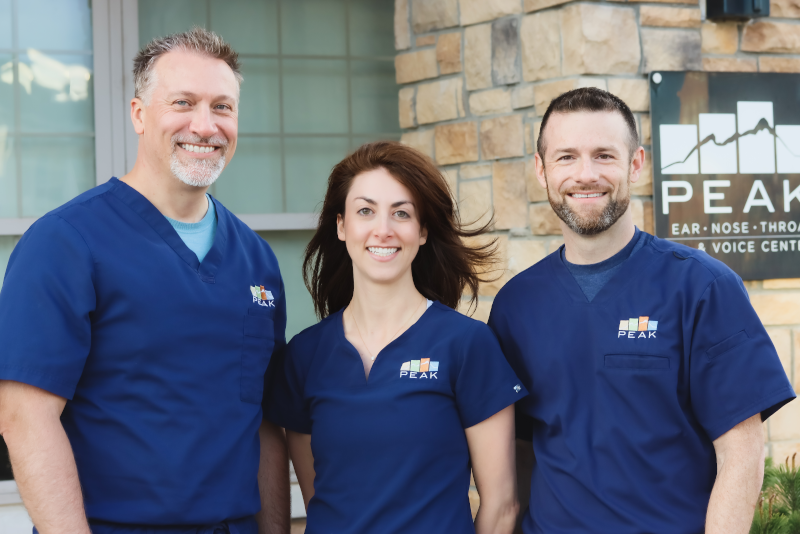Surgery (removing the tonsils and/or adenoids) is recommended when the above problems are excessive or not controlled with conservative medical management.
Our Voice Clinic in Colorado
Home » Denver Throat Doctor
Throat Issues & Problems | Broomfield • Golden • Brighton • Colorado • Denver

Your throat is responsible for two of the most common actions you perform every day: talking and swallowing. So when you start noticing signs of a problem with your throat or voice, you’ll need to visit a voice clinic in Denver for an accurate diagnosis.
The telltale signs of a damaged throat include dry windpipes, a hoarse voice, and frequent urges to clear your throat.
Peak ENT is a Denver otolaryngology specialist focused on ENT or ear, nose and throat issues. As a voice clinic in Colorado, we provide patients with comprehensive voice and throat care. Peak ENT’s physicians are Colorado’s best when it comes to picking a doctor for your throat issues.
Some of the disorders we treat include:
- Tonsil and adenoid problems
- Recurrent strep throat
- Mouth and throat pain
- Snoring
- Sleep apnea
- Swallowing difficulties
- Hoarseness
- Vocal changes
- Vocal cord nodules and polyps
- Taste disorders
- Neck mass
Comprehensive Care for Patients with Throat Issues
Seeing a physician is essential if your voice has been hoarse for more than three weeks. Any severe changes to your voice after a few days might be a sign of something serious, as well. These could be a sign of thyroid problems, heartburn, voice box trauma, or neurological disorders that need immediate medical attention.
Our treatment options include simple behavioral changes to surgery. We treat various throat and voice disorders to help restore your voice, breathing, and ability to swallow.
Set an appointment with us today.

Our Specialists Team

Peak ENT Departments
Our Throat Department
Sore Throat Issues? We have answers.
Sore throat is a common symptom of many disorders, and most people will experience this symptom at least a few times a year, typically along with short viral illnesses or colds. Other common causes include bacterial throat infections, sinus infections, allergies and dry air (especially during the winter months). Acid reflux can also cause a sore throat, particularly in the morning. Less common causes of sore throat include tumors of the throat, inflammation, or calcification of ligaments in the neck, muscle tension and overactive pain nerves in the throat.

When should a sore throat be evaluated by an ENT doctor?
- A severe sore throat that does not respond to standard treatments prescribed by a primary care provider or urgent care. This may be a sign of an abscess or other serious causes.
- Trouble breathing or inability to swallow.
- Inability to open the jaw. This is often a sign of more serious infection or abscess.
- Prolonged (more than 2 weeks) despite standard medical treatment.
- Soreness that recurs frequently.
- Lump(s) in the neck, particularly if this is persistent.
- Hoarseness lasting more than 2 weeks.
How will an ENT doctor evaluate my sore throat?
- A thorough history as well as head and neck exam will be performed.
- If the cause of the sore throat is not readily apparent, or if there is concern about other serious pathology such as swelling around the airway, a flexible fiberoptic laryngoscopy may be performed. During this diagnostic procedure, a numbing spray is applied to the nose and a flexible scope with camera is passed through the nose to visualize the throat, voice box and airway.
- Occasionally, further diagnostic testing including lab work or even a CT scan may be recommended.
Swallowing Problems

Swallowing issues? We can help.
Many times, swallowing problems are a complex set of issues. Peak ENT physicians and staff are experts in solving swallowing problems.
How do we swallow?
The swallowing mechanism involves a series of highly coordinated muscle movements. These movements can be divided into 4 phases:
1. Oral preparatory phase: food is chewed and mixed with saliva, forming into a cohesive collection called a “bolus.” This bolus is positioned on the tongue for the next phase.
2. Oral transit phase: the tongue pushes the prepared bolus from front to back into the pharynx, where the next phase is automatically triggered.
3. Pharyngeal phase: an automated sequence of muscle contractions occurs which lifts the larynx and pulls it forwards, closes the vocal cords, closes a flap called the epiglottis over the vocal cords and airway, directs the food bolus towards the opening of the esophagus and opens the sphincter at the upper end of the esophagus to allow the bolus to pass.
4. Esophageal phase: slowest phase (can take up to 20 seconds). Bolus is transferred from the upper end of the esophagus to the stomach. Gravity helps with this process, as well as coordinated muscle movements in the esophagus called peristaltic waves.
How are swallowing disorders diagnosed?
A comprehensive evaluation by an ENT doctor can often determine the cause of swallowing trouble. In addition to a thorough exam, a procedure called fiberoptic laryngoscopy will likely be recommended. During this simple office procedure, a flexible scope with camera is inserted through the nose to examine the throat and voice box. The patient may be given some different substances to swallow during this test, in which case the test is termed Fiberoptic Endoscopic Evaluation of Swallowing (FEES).
If a cause still cannot be determined, a transnasal esophagoscopy (TNE) may be recommended. During this procedure, a specialized scope is placed through the nose and all the way down the esophagus to the stomach. Traditionally, gastroenterologists perform similar upper-GI endoscopies (Esophagogastroduodenoscopy or EGD) under sedative anesthesia which requires close monitoring and extended recovery time. Otolaryngologists with special training now perform this procedure in the office with minimal discomfort. TNE has proven useful for diagnosing esophageal disorders such as strictures (narrowing), infectious/inflammatory diseases and abnormal pre-malignant or malignant lesions at the gastro-esophageal junction (Barrett’s Esophagus and carcinomas).
Esophageal Cancer
Esophageal Cancer has the fastest growing rate of all cancers in the United States and is the seventh leading cause of cancer deaths world wide. In addition to problems swallowing, many of the early symptoms of esophageal cancer include chronic cough, hoarseness, and globus (sensation that something is stuck in the throat). Long-standing untreated or undiagnosed gastroesophageal reflux (GERD) and laryngopharyngeal reflux (LPR) are considered significant risk factors for developing cancer of the esophagus. Patients with these symptoms should undergo an esophagoscopy and/or barium swallow study for further evaluation and screening.
Tonsillectomy
Surgery to remove the tonsils and/or adenoids is usually recommended to treat persistent, serious, or recurring infections of these tissues, or to address obstruction caused by excessive enlargement of these tissues. There are many methods to perform surgery, but typically a cautery device is used to remove each tonsil through the mouth, cutting the tissue and sealing off bleeding. The adenoids are removed with a similar method, also through the mouth. Most commonly, no stitches are placed. The open areas heal on their own. During the healing phase, the areas will become covered with a scab or “eschar,” which will thicken and may change colors over the first few days. These eschars then dissolve and slough off several days after surgery.
Overall risks related to surgery are low, however the recovery period is predictably long and rough. A severe sore throat is to be expected, which typically gets worse before it gets better, peaking around day 6 or 7 on average. Recovery is usually worse and longer in teenagers and adults than in younger children. Typically children will need about 1 week off from school to recover. Adults may need 2 weeks off work. Heavy physical activity and sports should be avoided for 2 weeks.
The surgeons at Peak ENT will be with you every step of the way during the recovery process. One of our four physicians is always on call and reachable for the group, 24 hours a day, 7 days a week. We do not share calls with other groups, nor do we have residents or mid-level providers covering our calls.

Tonsils & Adenoids
Tonsils & Adenoids
Tonsils and Adenoids are similar to lymph nodes (sometimes erroneously called “glands”) in the neck, groin and armpits. Tonsils are two round lumps in the back of the throat on each side of the tongue. Adenoids are high in the back of the throat behind the palate and are not normally visible through the mouth. Both tonsils and adenoids “sample” bacteria and viruses that enter the mouth or nose and are part of the immune system. Sometimes however, they can do more harm than good.

The two most common problems are:
- Infection (either recurring infections requiring antibiotics, or a chronic smoldering infection that never really goes away)
- Significant enlargement that causes problems with obstruction (nasal obstruction, mouth-breathing, snoring, sleep apnea and/or swallowing problems)
Other problems with the tonsils which may require treatment:
- Abscess around the tonsil (peritonsillar abscess)
- Cancer or suspected cancer of the tonsil
- Tonsilloliths (Tonsil stones) – collections of white debris within pockets of the tonsils that is foul-smelling and can cause bad breath and chronic irritation
Airway Disorders
Airway Disorders
Airway disorders include abnormalities that affect the anatomy of the upper airway (throat and trachea). Patients present with difficulty breathing that may be gradual or sudden. Causes of airway obstruction include swelling from infections, inflammatory diseases, benign or malignant tumors, or scar tissue that narrows the breathing passage.
Specific treatments are aimed at the underlying cause and may include medications and/or surgical intervention. Our physicians perform an in-office endoscopy with specialized scopes to make the diagnosis quickly and safely.
Lasers
Lasers are frequently used to treat airway disorders. Peak ENT physicians have extensive training in the use of a variety of laser types to treat laryngeal and tracheal lesions. Advanced technology has made possible minimally invasive techniques that are sometimes carried out under local anesthesia (without sedation) in the Summit Office in Broomfield. Dr. King is the only ENT surgeon in the state of Colorado performing these procedures.
Subglottic Stenosis
The subglottis is the upper trachea just below the vocal cords. Subglottic stenosis (narrowing) can result from infections, autoimmune diseases, severe reflux disease, or trauma, however in some cases no cause can be identified (idiopathic). When the narrowing significantly impairs breathing, laser surgery and dilation of the narrowed segment can often achieve a normal tracheal airway diameter.
Throat Cancer
Denver Throat Cancer Doctor

Every year, more than 55,000 Americans will develop cancer of the head and neck, including throat cancer. Around 13,000 Americans die every year from these types of cancer. Smoking and other forms of tobacco use are the main risk factor for developing cancer of the mouth and throat, though these cancers can also develop in nonsmokers. A significant cause of these cancers in nonsmokers as well as younger patients is Human Papilloma Virus (HPV). Like many other types of cancer, treatment is most successful when the cancer is caught early.
What are symptoms of head and neck cancer including throat cancer?
- A lump in the neck. Any lump in the neck that persists more than 2 weeks should be evaluated by your physician. Sometimes a lump in the neck may be the first and only sign of an otherwise undetected cancer of the throat.
- Changes in the voice. Hoarseness or changes in the voice that persist more than 2 weeks should be evaluated. The physicians at Peak ENT utilize high definition endoscopes to provide the most accurate diagnosis of vocal cord disorders, including detection of early vocal cord cancers.
- Growth in the mouth. Any sore or growth in the mouth that does not go away in a week or two should be evaluated.
- Coughing up blood, or blood in the sputum. If this persists beyond a few days, you should see your doctor. An endoscopic exam by an ENT may be necessary to determine the cause.
- Trouble swallowing. A tumor in the throat can cause difficulty swallowing by obstructing the passage of food and/or liquids. The providers of Peak ENT have the ability to diagnose and treat a number of swallowing disorders.
- Persistent earache. Branches of the same sensory nerves go to the ear as well as the throat. Therefore, sometimes throat problems (infection or cancer) are felt in the ear, sometimes even without any throat symptoms. Any persistent and unexplained ear pain deserves a thorough evaluation of the throat by a qualified ENT physician.
Laser Procedures

Lasers are frequently used to treat vocal cord, throat, and airway disorders. Dr. King has extensive training in the use of a variety of laser types to treat laryngeal and tracheal lesions. Advanced technology has made possible minimally invasive techniques that are sometimes carried out under local anesthesia (without sedation) in the Summit Office in Broomfield. Dr. King is the only ENT surgeon in the state of Colorado performing these procedures without sedation in the office setting.
Office-based procedures Dr. King performs under local anesthesia include:
- Laser ablation of benign and malignant lesions of the larynx, and trachea
- Laser ablation and endoscopic balloon dilation of laryngeal and tracheal stenosis (narrowing)
- Endoscopic biopsies of the larynx, trachea, and esophagus
- Vocal cord injection augmentation for vocal cord paralysis
- Vocal cord Botox® injections for the treatment of Spasmodic Dysphonia and laryngeal tremors
- Trans-nasal Esophagoscopy (TNE)
Peak ENT is equipped with state-of-the art equipment to treat a variety of voice, airway and swallowing disorders. Both our Summit and Golden offices house new digital endoscopic scopes and tools that help make diagnoses that otherwise may be missed with traditional fiberoptic equipment. Digital video recordings for detailed stroboscopy (voice analysis) and esophagoscopy can be done in the office.
Digital endoscopes not only offer impeccable diagnostic imaging, they have the advantage of serving a therapeutic role as well. Our scopes are equipped with working channels that enable Dr. King to perform minimally invasive in-office procedures that previously had to be carried out in the operating room under general anesthesia (full sedation).
Dr. King specializes in performing procedures under local anesthesia without sedation. Peak ENT is truly unique in offering our patients a variety of procedures without the added risks and recovery time that come with general anesthesia. Only a few major medical centers around the country have the equipment and expertise needed to carry out the same procedures that Dr. King performs in Broomfield and Golden facilities. In fact, he is the only physician in Colorado to offer non-sedated, minimally invasive laser surgeries of the larynx and upper airway.
Transnasal Esophagoscopy

Transnasal Esophagoscopy (or TNE)
Transnasal Esophagoscopy (or TNE) is a procedure that is performed without sedation in the office. During the procedure, a flexible endoscope with high definition camera is placed through the nose, then into the throat, esophagus and stomach. This provides excellent imaging quality for the diagnosis of various swallowing and esophageal disorders. Biopsies of any abnormal tissue can also be performed at the time of the procedure. For many patients, this procedure takes the place of traditional upper endoscopy (EGD) performed by gastroenterologists (GI specialists). EGD requires sedation and is performed in a hospital or appropriate outpatient facility, adding risk as well as significantly increased cost to the patient.
The providers of Peak ENT perform transnasal esophagoscopy in the office and are proud to offer our patients this lower risk, lower cost alternative to traditional upper endoscopy.
Cough

Cough
Chronic cough is a common, often frustrating problem we see among our patients. Cough can have a variety of causes, including allergies, sinus or throat infections, asthma, acid reflux, lung disease, problems with nerves to the throat, and side effects of certain medications.
The physicians at Peak ENT will perform a thorough examination of the nose, sinuses and throat to help determine the likely cause(s) of your cough.
Peak ENT offers allergy testing if allergies are suspected as a cause of your cough.
Many patients with chronic cough will benefit from voice therapy. The providers at Peak ENT work closely with Julie Artigliere, Ph.D, a speech and language pathologist specializing in voice disorders and cough.


